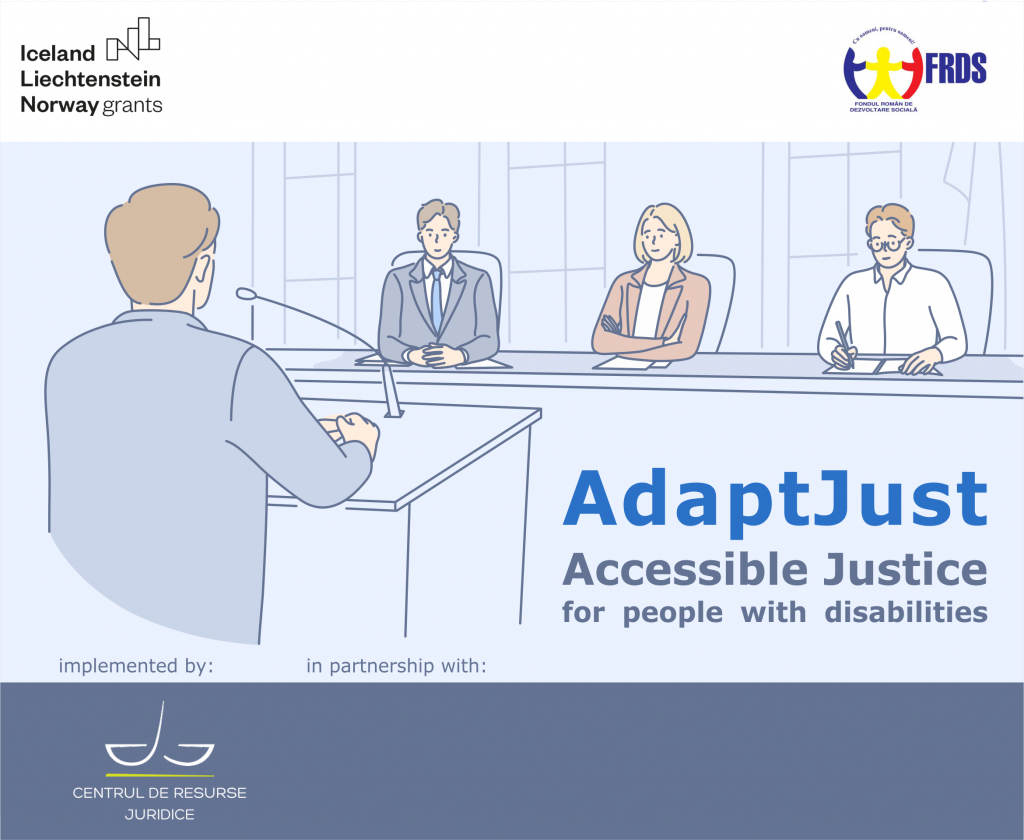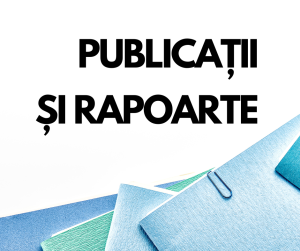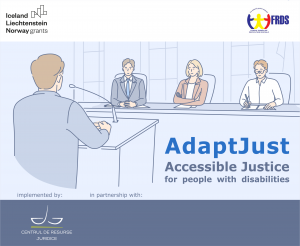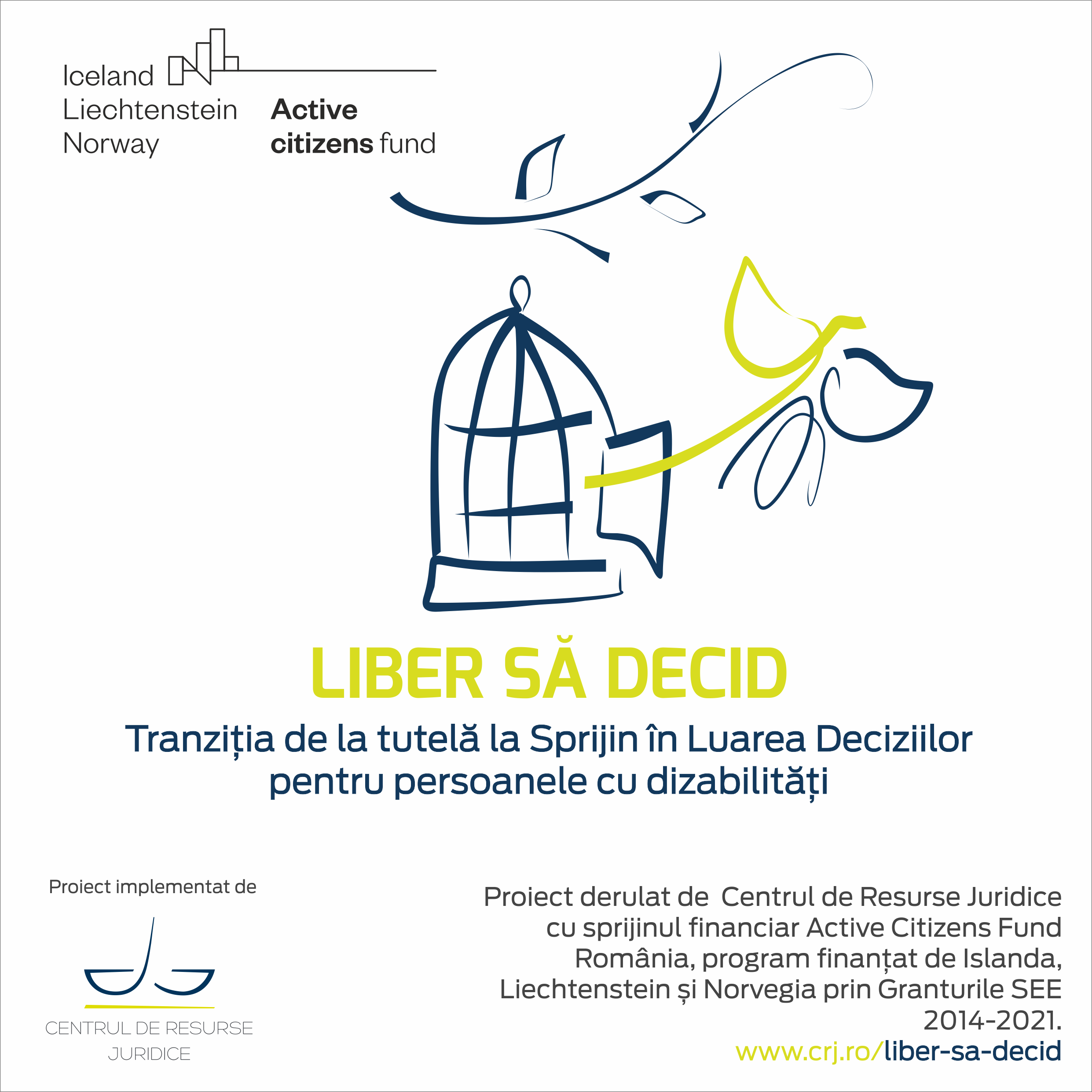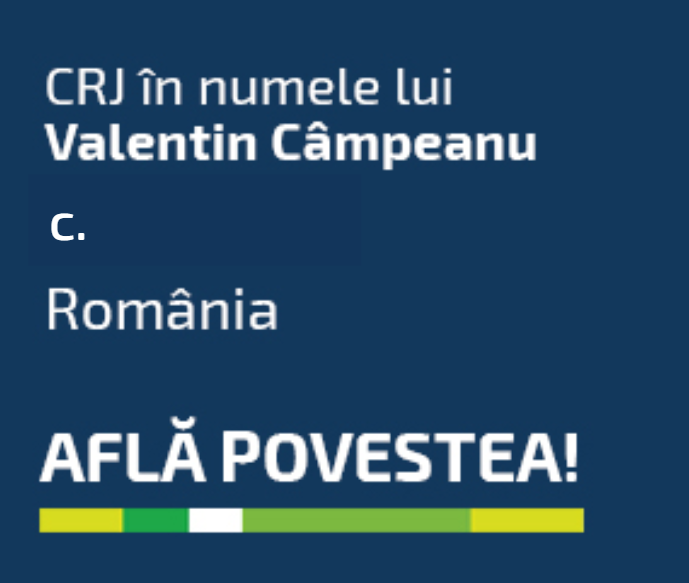What is AdaptJust?
The AdaptJust project is a project run by the Centre for Legal Resources (CRJ) in partnership with the Public Prosecutor’s Office of the High Court of Cassation and Justice.
AdaptJust is a project that aims to make it easier for people with intellectual disabilities and/or mental health problems to access justice.
The project is funded (money) with €1,324,994 from several countries: Iceland, Liechtenstein and Norway through EEA Grants under the Local Development Programme.
There are currently almost 17,500 people with disabilities living in institutions in Romania. Half of these people have a mental disability.
The law says that people with disabilities have the right of access to justice.
This is written into the UN Convention on the Rights of Persons with Disabilities. That is why the Romanian state is obliged to train, through courses, all those working in the justice system about the needs of people with disabilities and respect for their rights.
Dictionary of terms:
Access to justice – A person with disabilities can claim their rights in court and these rights are respected. Specifically, access to justice means several things, including:
- having what the law says and what the lawyer, judge or prosecutor says explained to you in a way you understand.
- When you go to court, your needs must be taken into account, such as: you are spoken to slowly and in simple words; you are explained what is going to happen; you are translated into sign language; you are given a separate, quiet room; you are allowed access with a guide dog and so on.
- have the right to ask for or choose a lawyer.
CRJ:
Short for Legal Resource Center.
ECHR:
Short for European Court of Human Rights
Funding:
An amount of money someone receives to do a project or activity.
National Protection Mechanism:
Several measures that are taken throughout the country for the benefit of certain people. In this case, the measures relate to people with intellectual and/or psychosocial disabilities.
Abuse:
A bad or unfair act that happens to you.
Examples of abuse: being beaten, being forced to have sex if you don’t want to, being locked up without being allowed to leave a room or building, being tied up or punished in any way, having your personal belongings taken away, not being allowed to make phone calls.
NGO:
Short for non-governmental organization (association).
The AdaptJust project has several aims:
- To make the justice system simpler and better for people with disabilities confined to residential centres.
- Romania to do what the European Court of Human Rights (ECHR) decides about people with intellectual and psychosocial disabilities locked up in residential centres.
- Teach legal professionals and mental health doctors what the rights of people with disabilities are and how to enforce them.
- Teach self-represented people with disabilities to complain to the authorities when their rights are violated.
- To get the message across through radio, TV and social media (Facebook) campaigns about the rights of people with disabilities so that everyone knows about them and applies them.
- Who is organising the project: the Legal Resource Centre organisation
- Who is partner in the project: the Public Ministry – the Prosecutor’s Office of the High Court of Cassation and Justice.
What the project aims to achieve:
Through this project, the Legal Resources Centre and the Public Ministry – Public Prosecutor’s Office of the High Court of Cassation and Justice aim to:
- Romania to apply the judgments of the European Court of Human Rights ( ECHR) and the Decisions of the Committee of Ministers of the Council of Europe regarding persons with intellectual and psychosocial disabilities confined in residential centres.
- to teach judges, prosecutors and people from NGOs to defend the rights of people with disabilities.
- Provide the government with an Action Plan for people with disabilities to be treated with respect in the institutions where they live.
Other objectives of the project:
- Help people with intellectual disabilities and/or mental health problems in their relationship with the justice system.
- Creates a national mechanism to protect the rights of people with disabilities living in residential centres or psychiatric hospitals.
- Organise courses for prosecutors, judges, lawyers, psychiatrists, psychologists and social workers on the rights of people with disabilities.
Activities:
- Courses on the rights of persons with disabilities.
- Courses on how to apply the judgments of the European Court of Human Rights (ECHR) and the Decisions of the Committee of Ministers of the Council of Europe on people with intellectual and psychosocial disabilities confined in residential centres.
- Courses for people with intellectual or psychosocial disabilities and courses for those working in NGOs on how to complain to the ECHR and the European Commission when abuse occurs.
- Mechanism to protect the rights of people with institutionalised disabilities.
- Formation of a network of psychosocial specialists in the field of mental health and the rights of people with intellectual disabilities in public prosecutor’s offices and courts (in Bucharest sector 4, Iasi, Timisoara, Cluj, Bihor, Buzau and Sibiu).
- Writing and publishing a manual (book or document) on how people with disabilities or mental health problems should be treated.
- Write a Plan for Romania, called the National Action Plan, whereby the authorities ensure that people with disabilities or mental health problems are treated with respect. These people can be people in psychiatric hospitals, residential centres for people with disabilities, prisons or jails.
Project period: from November 2021 to October 2023.
Funding:
- The project benefits from a funding (money) of €1,324,994 provided by several countries: Iceland, Liechtenstein and Norway through EEA Grants under the Local Development Programme.

